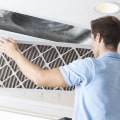The HVAC filter is an essential component of your home's heating, ventilation, and air conditioning system. It cleans the air just before it enters the blower and circulates through the ducts, trapping any contaminants that are in the air. Not only does this improve the air quality inside your home, but it also protects your HVAC system from potential damage. The air heats up or cools after it is introduced into an HVAC system. Filters capture particles as air moves through the blower and is then expelled through the ducts, so contaminants do not accumulate and interfere with operation.
In addition, filters also improve air quality because they trap those particles. If you have an electronic media filter, you don't need to worry about replacing the filter every 1-3 months. You can wait 6 months to a year before replacing it. You must replace it with the exact filter of the model. This may require ordering it on the brand's website to get an exact match. In some systems, filters are located in the return air duct.
This is the one that draws air from your space and returns it to the air conditioner's air handling system. If you have a large system with multiple air handlers and return ducts, finding the filters can be a challenge. The choice of HVAC filter depends on the type of system you have, the facility you are servicing, and your operational needs. As with the type of HVAC filter, how often those filters are changed will depend on the recommendations of the system manufacturer, the type of installation you are servicing, and your business needs. For example, hospitals and surgical centers may require HVAC filters to be changed every month or two for best results. The unit filter, especially if it is an HVAC unit that tends to be used almost all year round, should be changed by the homeowner at least every three months, but possibly more frequently. Buying a filter that is too small or large can cause gaps that let dirt, dust, and debris through, which can burn your HVAC system.
Consult your HVAC system manual to determine the strength of your model or call an HVAC technician. If, by any chance, you don't have a regular HVAC service technician to ask how to change an AC filter, you've probably neglected other important maintenance tasks besides changing the AC filters. In addition, a dirty filter that is exposed to condensation can become damp, which can cause mold to form that the HVAC system can spread throughout the home. When in doubt, the simplest solution is to ask your HVAC technician to provide you with the correct filters, or to show you filter size information so you can order them yourself. When selecting HVAC air filters for your workplace, the higher the filtration level you are looking for, the higher the MERV rating you should select. HVAC filters are essential to the operation and longevity of your equipment, maintaining good air quality in your facilities and for the health of the people in them. Most HVAC filters and ovens are disposable, made of biodegradable paper or similar media, and are shaped like cells, screens, or fins designed to trap as much debris as possible in the air. The easiest way to keep up with HVAC maintenance is to change filters at least every three months.
If you perform proper filter maintenance and your air conditioner or heater breaks down, your home warranty plan will repair or replace your HVAC unit. Proper maintenance of air filters, whether replacing or washing them regularly, is crucial not only to providing clean air in your home but also to maintaining proper functioning of your HVAC system.


